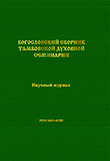Russian language as the basis of spiritual culture of the Russian nation
DOI:
https://doi.org/10.51216/2687-072X_2023_3_191-207Keywords:
Russian language, spiritual culture, Russian people, nation, traditional values.Abstract
The article is devoted to a topical issue related to the determination of the status of the Russian language in modern socio-political and legal discourse. The author analyzes the lexical meaning of the concepts “Russian language”, “culture”, “people”, “nation” in the context of the amendments made to the Constitution of the Russian Federation in 2020, as well as in the context of other federal legislative and regulatory acts aimed at preserving traditional national values. The article substantiates the fundamental role of the Russian people and the Russian language in the formation of the Russian state and nation. The modern Russian language,
defined by the Constitution of the Russian Federation as “the language of the state-forming people”, experienced at the initial stages of its formation a significant influence of Church Slavonic writing, as a result of which it plays an important role in the preservation of the national cultural heritage and traditional values. On the basis of the study, the author comes to the conclusion that the state, through legal acts, intends to take specific measures to prevent the spread of the two most dangerous threats to the national language: internal desecration and devaluation (through the spread of obscene expressions) and external Western expansion (through unauthorized lexical borrowings).
Downloads
References
1. Фролова, Н. Н. Язык и духовная культура общества / Н. Н. Фролова // Молодой ученый. – 2014. – № 5 (64). – С. 232–235. – URL: https://moluch.ru/archive/64/10093/ (дата обращения: 25.03.2022).
2. Гумбольдт В., фон. Избранные труды по языкознанию : пер. с нем. / Вильгельм фон Гумбольдт / общ. ред. Г.В.Рамишвили ; послесл. А.В.Гулыги и В. А. Звегинцева. – Москва : Прогресс, 2000. – 400 с. – ISBN 5‑01‑004661‑X.
3. Потебня, A. A. Мысль и язык / A. Потебня. – Москва : Лабиринт, 1999. – 300 с. – ISBN 5‑ 87604‑070‑3.
4. Карасик, В.И.Языковой круг: личность, концепты, дискурс / В. Карасик. – Волгоград : Перемена, 2002. – 477 с. – ISBN 5‑88234‑552‑2.
5. Кукушкина, Е. И. Познание, язык, культура / Е. Кукушкина. – Москва : Издательство Московского государственного университета, 1984. – 263 с.
6. Вежбицкая, А.Язык. Культура. Познание / Анна Вежбицкая. – Москва : Русские словари, 1996. – 416 с. – ISBN 5‑98216‑002‑5.
7. Матасова, Ю. А. Русский язык как выражение культурной и духовной общности народов России, государственный язык Российской Федерации / Матасова Юлия Анатольевна // Молодой ученый. – 2017. – № 1 (135). – С. 533–535. – URL: https://moluch.ru/archive/135/37900/ (дата обращения: 25.03.2022).
8. Пушкин, А. С. Полное собрание сочинений. В 17 т. Т. 3, кн. 1 / А. С. Пушкин. – Москва : Воскресенье, 1995. – 635 с. – ISBN 5‑88528‑061‑4.
9. Коровин, В. Почему русские государствообразующий народ? / Валерий Коровин // Изборский клуб : сайт. – URL: https://izborsk‑club.ru/19522 (дата обращения: 05.02.2022).
10. Хайруллин, Г. Т. Этнос и нация / Хайруллин Гриф Тимурзагитович // Архивариус. – 2017. – № 2 (17). – С. 50–56. – URL : https://www.elibrary.ru/download/ elibrary_29318723_79357736.pdf (дата обращения: 04.04.2022).
11. Петрова, Е. И. Соотношение понятий «этнос» и «нация»: философский аспект / Е. И. Петрова // Культура и цивилизация. – Донецк, 2019. – № 1 (9). – С. 61–71.
REFERENCES
1. Frolova N. N. Yazyk i dukhovnaya kul’tura obshchestva [Language and spiritual culture of society]. Molodoi uchenyi [Young Scientist]. 2014, no. 5 (64), pp. 232–235. (In Russian). Available at: https://moluch.ru/archive/64/10093/ (accessed: 25.03.2022).
2. Humboldt W. Izbrannye trudy po yazykoznaniyu [Selected works on linguistics]. Moscow, Progress Publ., 2000, 400 p. (In Russian). 3. Potebnya A. A. Mysl’ i yazyk [Thought and language]. Moscow, Labyrinth Publ., 1999, 300 p. (In Russian).
4. Karasik V.I. Yazykovoi krug: lichnost’, kontsepty, diskurs [Language circle: personality, concepts, discourse]. Volgograd, Peremena Publ., 2002, 477 p. (In Russian).
5. Kukushkina E.I.Poznanie, yazyk, kul’tura [Cognition, language, culture]. Moscow, Moscow State University Publ., 1984, 263 p. (In Russian).
6. Vezhbitskaya A. Yazyk. Kul’tura. Poznanie [Language. Culture. Cognition]. Moscow, Russian Dictionaries Publ., 1996, 416 p. (In Russian).
7. Matasova Yu. A. Russkii yazyk kak vyrazhenie kul’turnoi i dukhovnoi obshchnosti narodov Rossii, gosudarstvennyi yazyk Rossiiskoi Federatsii [Russian language as an expression of the cultural and spiritual community of the peoples of Russia, the state language of the Russian Federation]. Molodoi uchenyi [Young Scientist]. 2017, no. 1 (135), pp. 533–535. (In Russian). Available at: https://moluch.ru/archive/135/37900/ (accessed: 25.03.2022).
8. Pushkin A. S. Polnoe sobranie sochinenii [Complete Works]. Moscow, Voskresen’e Publ., 1995, vol. 3, book 1, 635 p. (In Russian).
9. Korovin V.Pochemu russkie gosudarstvoobrazuyushchii narod? [Why are Russians a state-forming people?]. Izborskii klub [Izborsk Club]. (In Russian). Available at: https://izborsk-club.ru/19522 (accessed: 05.02.2022).
10. Khairullin G. T. Etnos i natsiya [Ethnos and nation]. Arkhivarius [Archivist]. 2017, no. 2 (17), pp. 50–56. (In Russian). Available at: https://www.elibrary.ru/download/elibrary_29318723_79357736.pdf (accessed: 04.04.2022).
11. PetrovaE.I. Sootnoshenie ponyatii “etnos” i “natsiya”: filosofskii aspect [The relationship between the concepts of “ethnos” and “nation”: a philosophical aspect]. Kul’tura i tsivilizatsiya [Culture and Civilization]. Donetsk, 2019, no. 1 (9), pp. 61–71. (In Russian).
Downloads
Published
License

This work is licensed under a Creative Commons Attribution-ShareAlike 4.0 International License.

